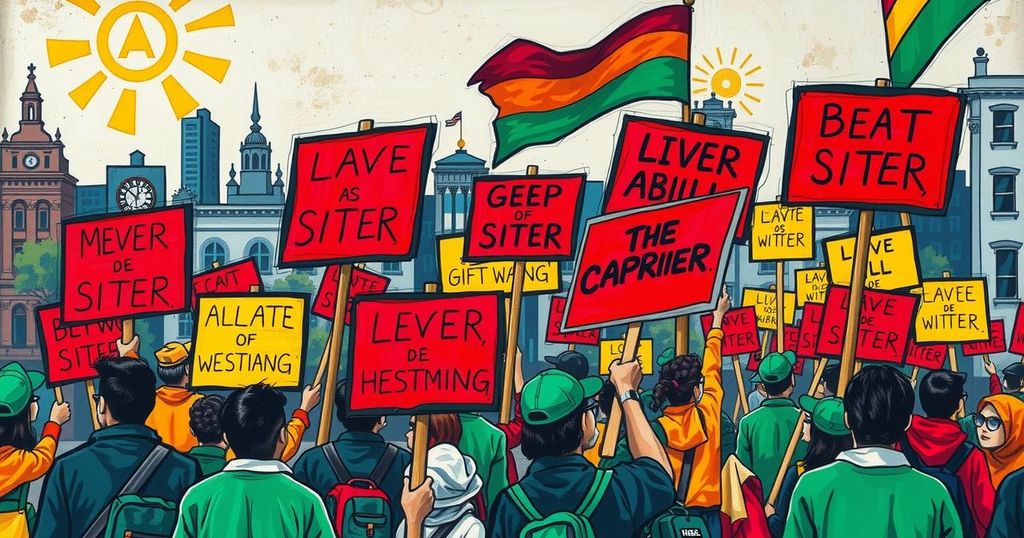Following the October 2024 elections, Mozambique has seen extensive protests sparked by grievances over police violence and alleged electoral fraud. The unrest has inspired solidarity demonstrations in Angola, revealing shared struggles against governmental repression and socioeconomic crises. Amidst police violence and human rights violations, civil society in Angola is becoming increasingly organized in its response to the MPLA government, echoing lessons learned from Mozambique’s activism.
Since late October 2024, Mozambique has experienced significant protests, initially sparked by demands for justice following the murders of lawyer Elvino Dias and political leader Paulo Guambe. Public outcry intensified in response to police violence against demonstrators and widespread skepticism regarding election results that proclaimed FRELIMO’s continued dominance. The protests feature diverse participants who have unified in chanting songs such as “People in Power” by Azagaia, a piece recognized for its critical stance on the government since its release in 2008 during prior unrest over rising prices.
The demonstrations persisted even after the inauguration of new officials, including President Daniel Chapo. Venâncio Mondlane, the opposition leader, subsequently called for a general strike. Public concerns about police brutality were highlighted when a protester, during an interview, questioned the violence directed at citizens. Reports indicate over 300 fatalities and 600 injuries since the protests commenced, as documented by the Mozambican organization Plataforma Decide.
In Angola, public demonstrations also erupted in solidarity with the Mozambican protesters, reflecting a similar backdrop of police violence in the Angolan capital, Luanda. FRELIMO, which has maintained power since Mozambique’s independence from Portuguese rule in 1975, faces significant challenges from rising opposition movements such as PODEMOS, which has amplified electoral discontent tied to corruption and youth disenfranchisement. Established in 2018, PODEMOS emerged as a key political competitor, taking seats in the legislature and capturing public sentiment against the established regime.
Venâncio Mondlane’s ascent to prominence is rooted in promises of national dialogue, investment in housing, and a commitment to civil rights. The recent elections were accused of irregularities, leading opposition parties including RENAMO and MDM to reject the results and call for discussions with the government. Unfortunately, confidence in the electoral process remains low among various factions, contributing to ongoing unrest.
The government’s response has been harsh, employing tear gas and rubber bullets against protesters, leading to a tragic toll of casualties, especially in areas prone to violence like Zambézia. Organizations such as Amnesty International have condemned these actions as excessive and reflective of human rights violations, prompting scrutiny from various international bodies advocating for peaceful resolutions between the government and opposition groups.
With mounting socioeconomic challenges similar to those seen in Mozambique, Angola’s government, led by MPLA since 1975, is apprehensive about the potential spillover of civil discontent. During protests in Luanda, citizens expressed their grievances not only concerning economic hardships but also solidified their demands for accountability from law enforcement. Reports of hunger, unemployment, and widespread discontent have driven the populace into the streets in protest.
In reflection of the situation in Mozambique, Angolan civil society is increasingly mobilizing against governmental repression, drawing insights from the activism seen in neighboring Mozambique. Initiatives such as local discussions on nonviolence demonstrate a commitment to fostering civil rights and advocating for social justice. Reports from NGOs monitoring human rights violations indicate a precarious environment for dissenting voices, with forecasts of ongoing scrutiny in the immediate future.
The recent wave of protests in Mozambique has not only highlighted deep-seated public grievances related to governmental repression and socioeconomic hardship, but it has also ignited a supportive movement for reform in Angola. With allegations of electoral fraud and increasing dissatisfaction with the status quo, both nations exhibit a common struggle against oppressive regimes. The experiences of Mozambican activists resonate in Angola, as civil society becomes emboldened to challenge authority while demanding accountability and justice amidst escalating unrest in both countries. The developments signal a critical juncture for political engagement and human rights advocacy in the region.
Original Source: globalvoices.org




